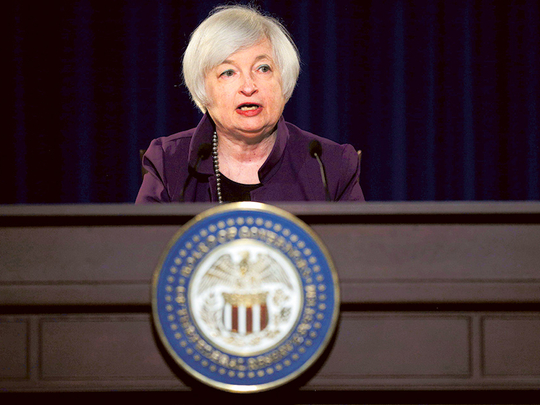
Abu Dhabi: Despite the reassuring sentiment from the US Federal Reserve’s vice-chairman earlier this week about an interest rate hike in 2016, analysts remain sceptical and expect the Fed will keep rates stable when they meet in September.
Until then, all eyes are on Janet Yellen, the Fed’s chair, who will speak on Friday at a symposium in Jackson Hole, Wyoming hosted by the Kansas City Fed. Analysts expect she will lay the foundation for a rate hike in the next months but not for the upcoming September meeting.
The three-day symposium kicked off Thursday, but the full programme for the event won’t be released until 4am (UAE time) Friday. Some central bankers, however, were reportedly scheduled to meet Thursday with members from the activist group, Fed Up, which is calling on the Federal Reserve to adopt pro-worker policies and keep interest rates low.
“On Friday, she [Yellen] doesn’t have to be dovish, she doesn’t have to be hawkish. I think she will just put the facts out in what her criteria would be for a rate rise, and I think the conclusion — if there is one — to all of that will be ‘I can afford to wait’. I think you’ll probably see [a hike] by December but probably not before that for the simple reason that after September you’ve got the presidential elections. The [Fed] meeting in November is on the 2nd, and that’s six days before the elections, so I suspect we won’t get one in September, we won’t get one in November, and it’ll have to be December,” said Sanyalaksna Manibhandu, director of research at the National Bank of Abu Dhabi Securities.
The probability of a rate hike in September is just over 20 per cent, according to Bloomberg estimates, and Yellen is unlikely to upset market expectations.
But the presidential elections are not the only block on the road to a hike.
Brexit uncertainty
“I think in September the data won’t be strong enough for the FOMC [Federal Open Market Committee] to vote for a rate hike. We still have some uncertainties with Brexit — yes, the stock market in the UK has done quite well after the Brexit but the pound is still weak and there’s uncertainty about what Europe without Britain would do. I also think she (Yellen) doesn’t want the dollar to get too strong because that will be bad for emerging markets,” Manibhandu said.
The minutes of the latest FOMC meeting in July showed that members were divided on the decision to hike rates. Since the minutes’ release, it has been a long-winded see-saw game between the Fed and analysts who pointed that the last speeches from Yellen were dovish.
Vijay Harpalani, fund manager at Al Mal Capital in Dubai, said that though economic data from the US has been encouraging, there are still risks in the global growth outlook, which makes the case for maintaining the status quo this week. Unlike NBAD’s Manibhandu, however, he doesn’t expect a hike until March 2017.
Stronger US dollar
Be it in December 2016, March 2017, or whenever else the hike comes, the US dollar is expected to gain more strength. And for the UAE, this spells more economic challenges considering dirham’s peg to the dollar.
“Significant appreciation of the US dollar over the last couple of years has presented economic challenges to the dollar-pegged countries. Inbound foreign direct investment, especially into real estate, is impacted, while outbound investment becomes more attractive,” Harpalani said.
Outbound investment may not seem all that attractive in the short term, though, as corporate investors in the UAE try to trim their budgets and focus on challenges in the domestic market before tapping external ones.
The currency’s appreciation over much of 2015 and 2016 has already impacted the tourism sector as the UAE becomes more expensive to some of its biggest source markets including Russia, Europe and the UK.
And it’s not just tourism. A dollar rally will add more pressure to already-low oil prices from which the UAE gets a big chuck of its revenues. The banking sector has also been facing challenges in the past few quarters as loan growth slows down and liquidity tightens.
“Banks in the UAE will most likely pass on higher cost of borrowing to customers, but this could hamper appetite for lending from corporate due to challenging macroeconomic conditions,” Harpalani said.












